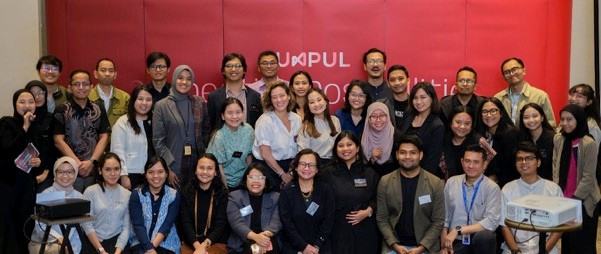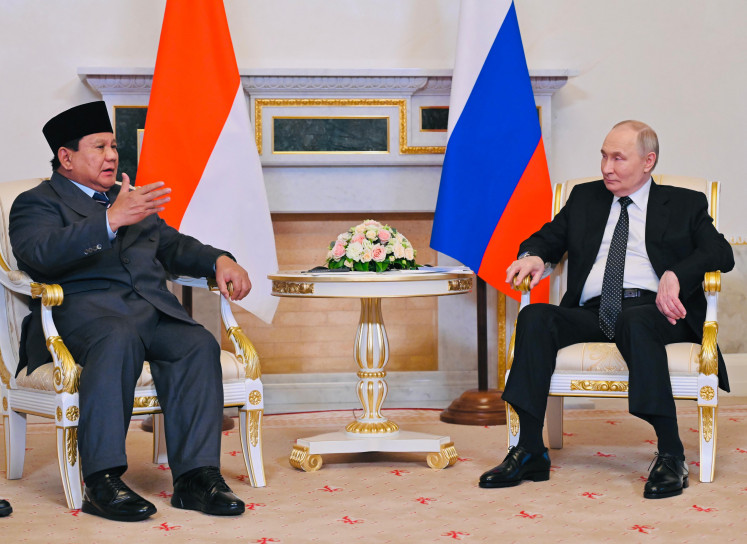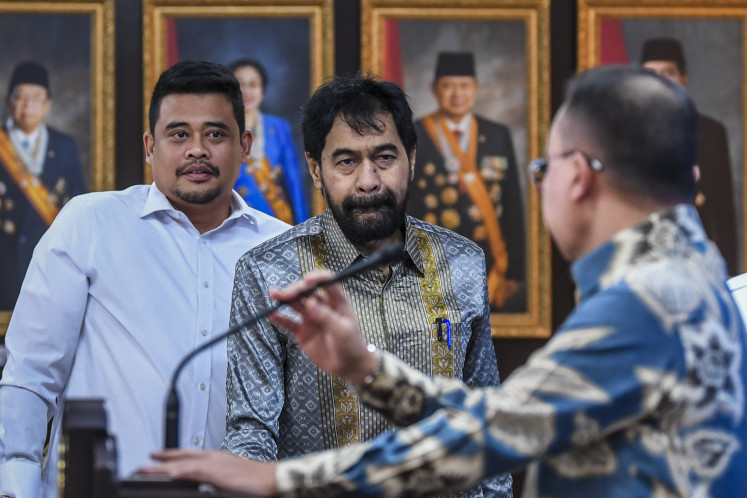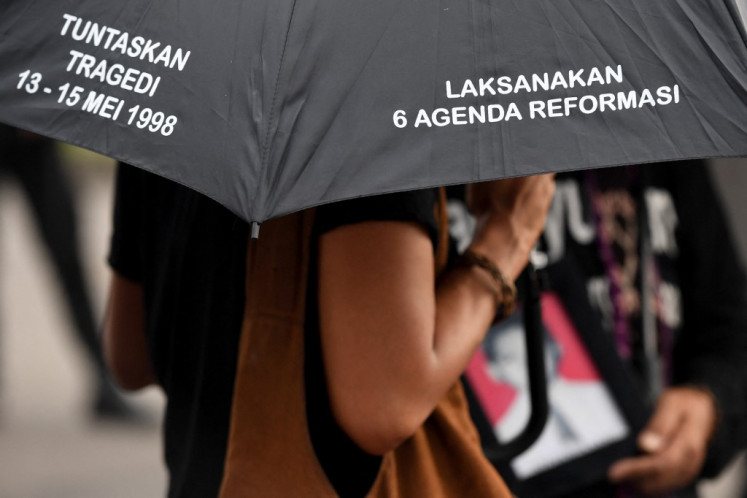Popular Reads
Top Results
Can't find what you're looking for?
View all search resultsPopular Reads
Top Results
Can't find what you're looking for?
View all search resultsSampoerna Public Expose: Retaining market leadership amid challenges in the industry
Change text size
Gift Premium Articles
to Anyone
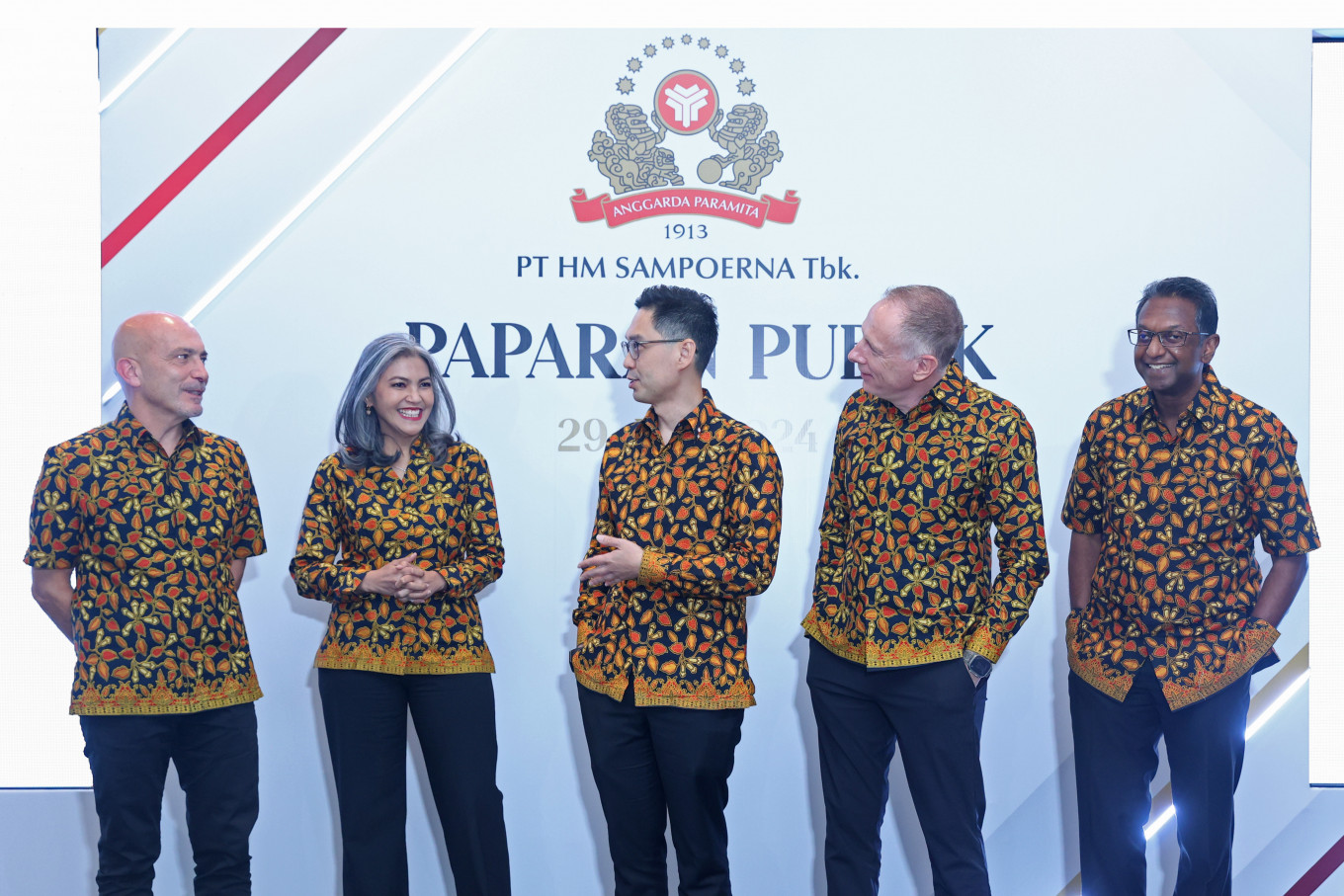 The President Director of PT HM Sampoerna Tbk. (Sampoerna), Ivan Cahyadi (third from left), accompanied by the Director of External Affairs, Elvira Lianita (second from left), Finance Director Sergio Colarusso (second from right), Smoke-Free Product Marketing Director Andre Dahan (left), and Director of Strategy & Program Delivery Sharmen Karthigasu (right), are seen chatting after a Public Exposé in Jakarta, Monday (29/07/2024).
The President Director of PT HM Sampoerna Tbk. (Sampoerna), Ivan Cahyadi (third from left), accompanied by the Director of External Affairs, Elvira Lianita (second from left), Finance Director Sergio Colarusso (second from right), Smoke-Free Product Marketing Director Andre Dahan (left), and Director of Strategy & Program Delivery Sharmen Karthigasu (right), are seen chatting after a Public Exposé in Jakarta, Monday (29/07/2024).
P
T HM Sampoerna Tbk. (Sampoerna), which has been operating in Indonesia for 111 years, has successfully retained its leadership in the tobacco industry with a market share of 27 percent and a solid portfolio across segments, as it builds a strong route to market engines through commercial innovation and expansion of smoke-free products.
“Throughout the first semester of 2024, Sampoerna recorded a sales volume of 39.9 billion sticks, net revenue of Rp57.8 trillion [US$3.54 billion] and net profit of Rp3.3 trillion,” Sampoerna president director Ivan Cahyadi said during the company’s annual public exposé in Jakarta on July 29.
“Sampoerna's success in retaining leadership in the national tobacco industry is supported by innovations across the entire portfolio, which includes new and innovative product launches in the cigarette and smoke-free product segments, two new production facilities for hand-rolled kretek cigarettes and new partnerships with five third-party operators [TPOs], as well as export performance with a value reaching more than US$100 million in the first semester of 2024," Ivan said.
He also said that while net revenue had risen 3 percent, sales volume and net profit had respectively declined 3 percent and 11.6 percent compared to the first semester of 2023.
“The performance of the tobacco industry is still full of challenges influenced by market dynamics. Although economic growth is relatively stable, the purchasing power of adult consumers has been on a weakening trend. Adding to the challenges of the tobacco industry are the pressure of double-digit excise rate hikes far above the inflation rate and the widening gap in excise rates between segments,” Ivan explained.
This had prompted a shift in consumption from tier-1 volume with the highest excise tax rates to cheaper products (downtrading), which was exacerbated by an increase in illicit cigarette distribution. The market share of the Below-Volume Tier 1 (BV1) segment in the first semester of 2024 reached over 44 percent, or double the figure of the same period in 2017.
“Moving forward, we hope that the government continues to issue a multiyear tobacco excise policy based on clear economic parameters like inflation rates, as well as in consideration of adult consumers’ purchasing power, to create a conducive and sustainable business and investment climate, combined with the continuous effort to combat illicit cigarette,” he said.
Ivan also expressed hope that the government would continue to implement policies that supported the continuity of labor-intensive segments, such as hand-rolled kretek cigarette (SKT) and halted the acceleration of downtrading to optimize state revenue from tobacco excise, emphasizing the importance of a balanced, risk-based excise policy to support innovation in the tobacco industry.
As part of its commitment to sustainable investment and encouraging innovation in the tobacco products industry, Sampoerna had realized investments totaling more than $300 million by the end of 2023 in a production facility for innovative smoke-free products, which was inaugurated last year. Focusing on exports to the Asia-Pacific and supplying the domestic market, the new facility is equipped with a world-class laboratory for testing smoke-free products, according to Ivan.
Sampoerna's commitment to commercializing innovative smoke-free tobacco products backed by science is also manifest in its strategic product portfolio expansion, the launch of seven new TEREA variants as well as the limited launch of VEEV in 10 major Indonesian cities.
VEEV, which uses a closed pod system, is part of the smoke-free product portfolio of Philip Morris International (PMI). Applying the method of heating nicotine-containing e-liquid, VEEV produces aerosol instead of smoke, significantly emitting lower levels of harmful chemicals compared to cigarette smoke.
"We are seeing positive growth with the number of IQOS users estimated to reach more than 200,000 adult consumers. And in the Jakarta urban area, IQOS has achieved a market share of 4.5 percent, or an increase of 1.8 percentage points from the second quarter of 2023. Urban Jakarta covers West, Central and South Jakarta, which comprise approximately 1.5 million legal-age nicotine users," Ivan added.
Economic & social footprints
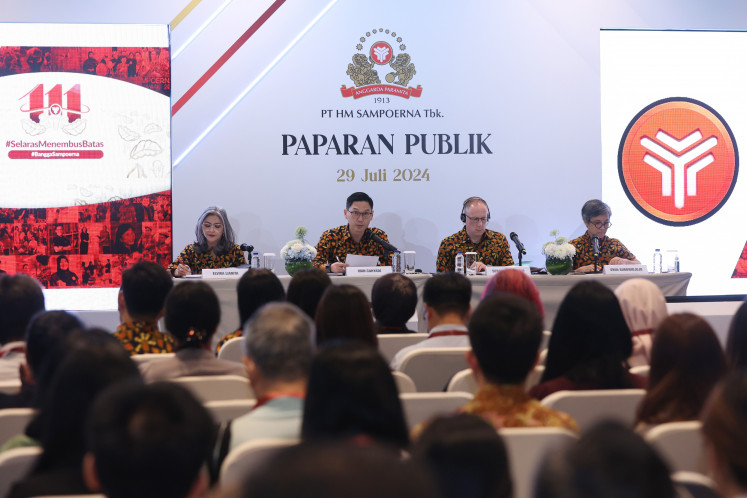
Throughout its 111 years of operations in Indonesia, Sampoerna is firmly guided by its “Three Hands Philosophy”, which aims to create value for key stakeholders, namely employees, business partners and shareholders, adult consumers and wider society.
Possessing significant economic, investment and social footprints across its supply chain, Sampoerna has reached total investment of $6.4 billion (Rp 103 trillion) since its acquisition by PMI in 2005. This is in line with its commitment to supporting the government's priority on industrial downstreaming. Last year, Sampoerna (including parent company PMI) contributed Rp 86.8 trillion in tax and excise.
In the first semester of 2024, Sampoerna has absorbed more than 90,000 direct and indirect employees, around 90 percent of which work in the labor-intensive SKT segment.
At present, Sampoerna operates one smoke-free product manufacturing facility in Karawang, two machine-made kretek cigarette (SKM) production facilities in Karawang and Pasuruan and six SKT production facilities, including two new SKT factories in Blitar and Tegal that began operating this year.
Sampoerna also partners with 43 TPOs belonging to regional entrepreneurs and/or cooperatives in various cities/districts across Java.
The company also reiterated its continued commitment to active involvement in developing Indonesia’s human capital. Its endeavors in this area focus on employees and business partners across its supply chain, including micro, small and medium enterprises (MSMEs) and tobacco and clove farmers in Indonesia, as well as the wider community.
Under its sustainability umbrella program, Sampoerna Untuk Indonesia (Sampoerna for Indonesia), which adopts the environmental, social and governance (ESG) framework, the company is contributing consistently to empowering MSMEs through its flagship programs, the Sampoerna Entrepreneurship Training Center (SETC) and the Sampoerna Retail Community (SRC). To date, more than 320,000 MSMEs nationwide have benefited from two empowerment programs.
Most recently, Sampoerna held Pesta Rakyat UMKM untuk Indonesia (MSME community for Indonesia festival) on July 22, 2024, collaboration with the Indonesian Chamber of Commerce and Industry (Kadin Indonesia).
The event was a demonstration of the company’s support for the government’s priority in accelerating inclusive and sustainable transformation by empowering MSMEs toward exports. It also showcased collaboration and synergy across stakeholders, including government, business associations, the private sector, academics, universities and the general public, in developing MSMEs using a multi-helix model.
"In addition to investment commitments, innovation and business downstreaming, Sampoerna's commitment to developing human capital is a real form of our contribution to creating sustainable economic and social value for Indonesia," Ivan said.





